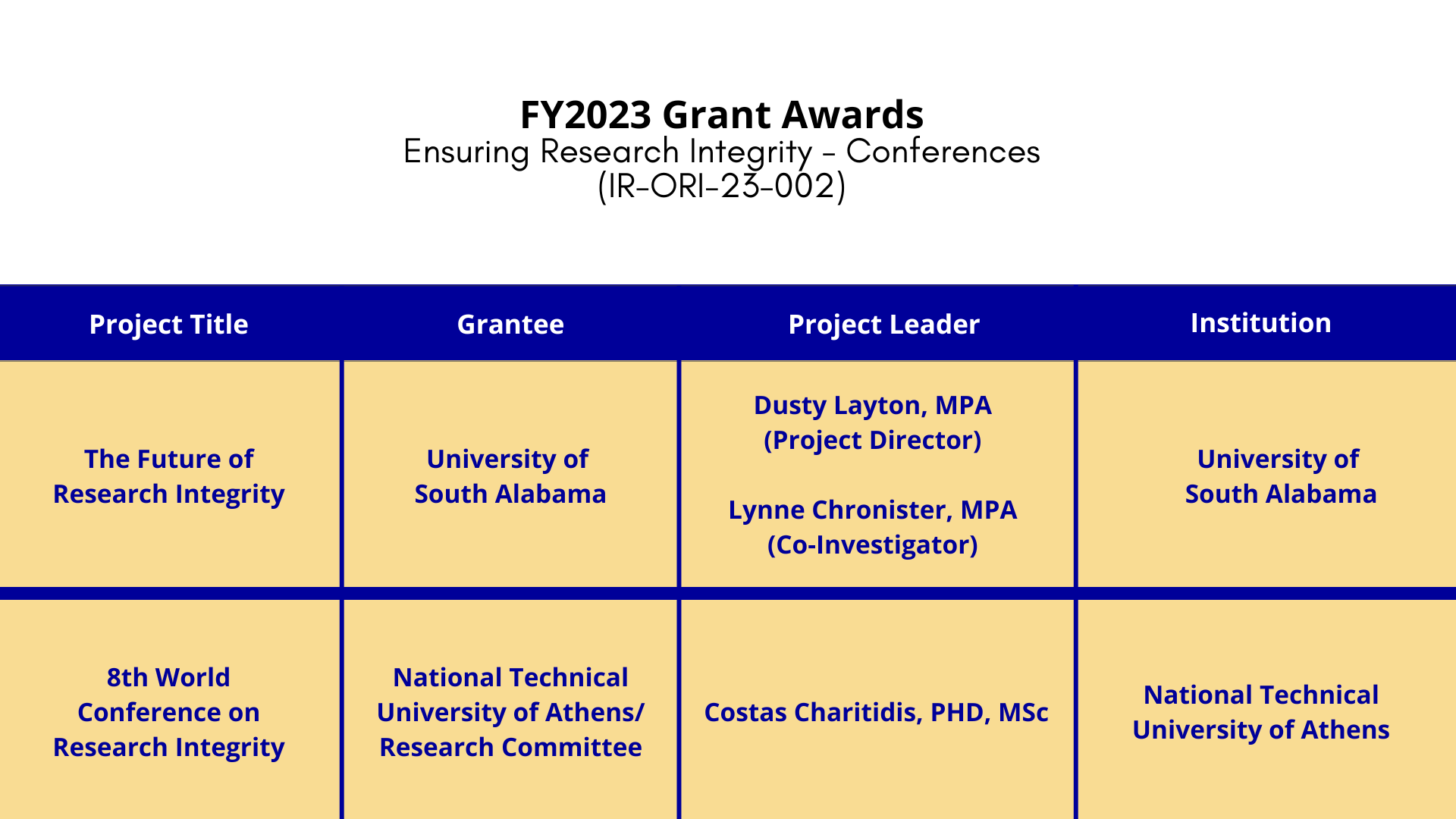
Project Title: The Future of Research Integrity
Grantee: University of South Alabama
Project Director: Dusty Layton, MPA
Co-Investigator: Lynne Chronister, MPA
Institution: University of South Alabama
Abstract:
Digital technologies are transforming the publishing industry and are capable of increasing access to scientific knowledge. Despite this, it is important to be cognizant of the technological challenges present and to collaboratively work with all stakeholders to maintain standards of research integrity in all aspects of the research process. Movement towards safeguarding and embracing the research environment through supportive mentoring, as well as diversity and inclusivity in science is fundamental to address impediments to and understand the applications of RCR education, as well as to nurture healthy research environments. In order to create and sustain a robust research ecosystem, we must analyze the factors that influence change into research practice. To this end, the University of South Alabama proposes to host a conference addressing the impact of the meteoric acceleration of science and technology on research integrity. The conference will be centered around three focus areas:
- Framework to support research integrity: focus on publication ethics, FAIR data, and artificial intelligence interface;
- Fostering research integrity amidst rapid technological changes: implications for the way science is supported, practiced, conducted and communicated;
- Safeguarding integrity while embracing change in research practices: cultivating and sustaining an ethical research environment.
These three areas are essential to the ethical conduct of research. They represent interrelated issues for evaluating changes to RCR and the ethical considerations we’re encountering. This rapid evolution of science and technology spans across topics in data publishing, artificial intelligence and automation, revolutionary developments in research integrity standards, and fostering inclusive environments. What’s in store for the future and how do we accommodate such rapid change?
The University of South Alabama will collaborate with statewide and regional academic universities to recruit conference attendees. The primary outcome is for conference participants to be better informed about the effects of technological change and perceived barriers within the research ecosystem and to be better prepared to cultivate a climate that advances responsible and ethical research. A secondary outcome will be to assess movements towards fostering healthy research climates, such as mentoring and inclusivity in our institutions. To effectively measure outcomes, we will conduct a pre and post survey of conference attendees. The qualitative assessment tools will be developed in consultation with the University’s Office of Institutional Effectiveness. We propose to expand the scope and impact of our post-conference assessment activities to capture attendees’ feedback, assess attitudes, and to identify changes that may be required in educational and training programs.
In order to create and sustain a robust research ecosystem, we must analyze the factors that influence change into research practice. Digital technologies are transforming the publishing industry and are capable of increasing access to scientific knowledge.
The following information was added to this post on 2/29/24:
You can visit this institution's conference page and find more information here: https://www.southalabama.edu/departments/globalusa/cce/research_integrity_conference/.
Project Title: 8th World Conference on Research Integrity
Grantee: National Technical University of Athens/Research Committee
Principal Investigator/ Project Director: Costas Charitidis, PhD, MSc
Institution: National Technical University of Athens
Abstract:
The World Conferences on Research Integrity (WCRI) are the longest running, largest and most significant events on the international Research Integrity (RI) calendar. The 8th WCRI builds on the successes of this series of international conferences, which have been held across the globe. These conferences provide opportunities for RI stakeholders including members of Research Integrity Offices (RIOs) and Research Ethics Committees (RECs), researchers at Research Performing Organisations (RPOs), i.e., Universities and Research Centers, Research Funding Organisations (RFOs), Policy Makers, Research Administrators and Managers, Publishers, Science Journalists and Science Bloggers to come together and discuss emerging RI themes and exchange experiences. The WCRI have resulted in several influential policy statements (the Singapore and Montreal Statements, the Amsterdam Agenda, the Hong Kong Principles, and – lately – the Cape Town Statement) that are recognised as authoritative contributions to the promotion of RI and Responsible Conduct of Research (RCR), as well as milestone documents for embedding RI and RCR as fundamental elements of all successful research processes and outcomes.
The 8th WCRI will be held in Athens, Greece in 2024 and is being organized, jointly, by the National Technical University of Athens (NTUA) and the National and Kapodistrian University of Athens (NKUA). Both Universities are publicly funded entities and are the largest universities located in the metropolitan area of Attica, Greece. The location of the 8th WCRI is important. The 8th WCRI has dual aim: (a) Greek institutional systems and structures related to RI are still not fully developed. In addition, researchers in Greece may be particularly vulnerable to some drivers that undermine RI, such as serious funding constraints from national sources, lack of adequate institutional support at the management level. The prestige of hosting a WCRI will help boost institutional change in Greece toward a culture that aligns more closely with Responsible Conduct of Research (RCR) and RI, thereby helping Greek researchers to become more competitive in the European research area and beyond. (b) The overarching theme of the 8th WCRI is “Catalysing the translation of research into trustworthy policy and innovation”. We selected this theme as a means of expanding beyond policy making and incorporating innovation as a critical factor in the research process. As such, we hope to spark discussion among different actors involved in the translation of research into outputs that support the trustworthiness of policy and innovation, identifying ways in which RI can enhance such trustworthiness. This discussion requires the engagement of researchers from all scientific disciplines as well as policy- and decision-makers who draw upon research evidence to inform their decisions as applied to industry and the broader society. Having an anticipated attendance at the 8th WCRI of between 1000 to 1200 participants (half of them attending physically, half of them attending via online means).

